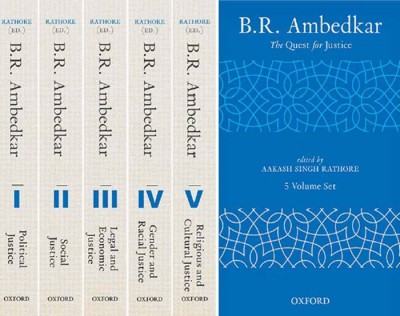New Delhi, Jan 14 : B.R. Ambedkar is known for his relentless pursuit of justice and equality across all spheres, which has established him as one of the pioneering architects of modern India. His ideas on the upliftment of Dalits still remain critically debated in Indian society, inspiring many previous and current socio-political movements.
Now, for the first time, the five-volume “B.R. Ambedkar: The Quest for Justice” (Oxford University Press) explores the major themes of research surrounding his capacious oeuvre and provide a summary evaluation of the state of Ambedkar studies internationally, highlight research trends both about and inspired by Ambedkar, and open up lines of future enquiry.
It offers a critical analysis of the realities of social inequality, diversity, exclusion, and marginality that Ambedkar’s work has drawn our attention to, as well as of his writing itself.
Volume 1 focuses specifically on the theme of political justice, including explorations in political theory inspired by Ambedkarite thought.
Volume 2 examines key issues in social justice, especially in terms of Indian democracy, and provides a wide range of perspectives all anchored in Ambedkar’s work and writings.
Volume 3 covers legal and economic justice. The first part explores the literature on the Indian constitution and its institutions, the idea of constitutional morality, rights and the rule of law, and Ambedkarite jurisprudence. The second part turns to a variety of issues in economic justice anchored in Ambedkar’s economic philosophy.
Volume 4 focuses on gender justice and racial justice. The first part explores Ambedkar’s impact on efforts to achieve gender justice in India, and offers various readings of Ambedkar as a feminist. The second part turns to comparisons of race and caste and explores the ways in which the movements for racial justice and caste equality can learn from one another and seek strategies of synergy.
Volume 5 treats of religious justice and cultural justice. It covers topics such as conversion, Navayana Buddhism, and liberation theology. The second part explores timely issues in cultural justice inspired by Ambedkar’s own activism and struggles.
The general editor of the series, Aakash Singh Rathore, is author of Ambedkar’s “Preamble: A Secret History of the Constitution of India” and regular contributor to newspapers and magazines. Rathore has taught at Jawaharlal Nehru University, the Universities of Delhi, Rutgers, Pennsylvania, Toronto, Humboldt Berlin, LUISS-Rome, and Jindal Global University.
His 20 previous books range from political philosophy, law, and religion to literature, sports, and wine. These include Hegel’s “India: A Reinterpretation, with Texts”, and “B.R. Ambedkar’s The Buddha and His Dhamma: A Critical Edition”. He is also author of the forthcoming book, “B.R. Ambedkar: A Definitive Biography”.
–IANS
vm/ash

